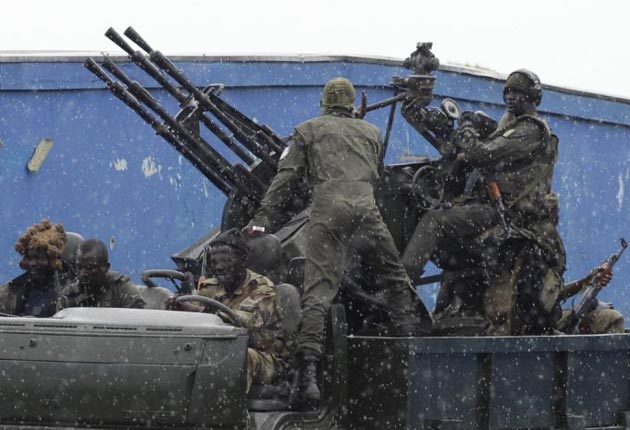France vows 'strong response' as Gbagbo launches fresh attack
Ambassador's residence targeted as UN says pariah's forces have made significant gains

The battle for Abidjan escalated last night as forces loyal to international pariah Laurent Gbagbo fired on the French ambassador's residence.
It was unclear if there had been any casualties, but French military sources vowed a "strong response". Attack helicopters were seen leaving the French base soon after the mortar and rocket attack, which was the strongest attempt yet by Mr Gbagbo to force former colonial power France into a fight which would rally Ivorian nationalists.
Claims from the UN that Gbagbo's forces had regained the highly important areas of Plateau and Cocody were unconfirmed. A spokesman for the French forces refused to discuss what he called rumours, with Major Frederic Daguillon making only the enigmatic comment: "The helicopters have gone up and their engines are working just fine." However, it became clear that previous air strikes by the UN and France aimed at Gbagbo's heavy weapons failed to destroy all of them.
Earlier in the day, residents of Abidjan emerged from their hiding places to find themselves in a city living through a striking reversal of fortune. Where the challenger Alassane Ouattara was confined for months to the Golf Hotel complex surrounded by the Ivorian army, yesterday it was his rival Mr Gbagbo who was cut off from the outside world, under siege in his bunker. While many had expected a bloody final confrontation and Mr Gbagbo was being talked of as a possible martyr, the President-elect Mr Ouattara has decided to wait out his opponent. "We are waiting for the rat [Mr Gbagbo] to leave its hole," said a spokesman for the man recognised by much of the rest of the world as Ivory Coast's legitimate leader.
For the first time since heavy fighting reached the outskirts of Abidjan a week ago, residents were out in numbers. The resigned columns of women collecting water were joined by participants in more ordinary scenes. Old women squatted on street corners to sell beans; boys rode through the debris on their bicycles and a handful of private cars joined the armoured cars on the roads. There was no sign of Abidjan's distinctive orange and yellow taxis though. And reports continued of sporadic shooting in some areas.
For normality to return to large sections of the city scarred by looting and riddled with roadblocks, the police will have to go back to work. Mr Ouattara had appealed for them to do so, promising three months' wages as an incentive. French and UN officials spoke of "mixed patrols" to help clear up the damage and restore order but there was no sign of either yesterday evening.
Commander Didier Moncuit from the French gendarmerie said it would take time for the police to go back to work.
"It's possible for us to work together but it hasn't happened yet," he said. "Today we can see the population again, they are out on the streets." But the youth militia called on to the streets by Mr Gbagbo remain a threat, he warned: "The Young Patriots are everywhere."
The commander is still confined to patrolling in an armoured car mounted with machine gun. His squad in their body armour were working on another rescue mission, this time an 87-year-old French citizen who was critically ill. Standing outside their home in Zone 4, her son Menhem Sabbague said he felt secure in his area near the French base and would stay put. "Everybody is fed up with Gbagbo," he said. "All Abidjanis want to go back to normal now."
Many were responding to Mr Ouattara's call on Thursday for a return to normal life. Speaking from his lagoon-side hotel, he promised to contain the remnants of Mr Gbagbo's forces behind a military cordon. In the meantime, the former economist said banks and shops should reopen and appealed for international sanctions, put in place to pressure Mr Gbagbo to resign, to be removed. Ivory Coast, the world's leading cocoa exporter, has watched its economically-vital crop rot at the docks as the crisis has dragged on. Only the food queues, hundreds deep, where people waited for a single loaf of bread, revealed the full impact of the past week. Water has been reconnected in a handful of areas but most of the city is still blighted by serious shortages of food and medicine and hospitals remain cut off.
Analysts said Mr Ouattara was gambling that some of his rival's remaining loyalists would swing over to his side if the former opposition leader was able to restore order. The precariousness of the situation was demonstrated by another French operation to extract the Mauritanian ambassador, whose residence was under threat. Coming two days after the dramatic rescue of the Japanese envoy, it showed a country and a city poised between war and recovery.
Among those running out of patience was 17-year-old Kone Balla, who yesterday tried to be evacuated to the French base. A student from the Ouattara stronghold in the Abobo district of northern Abidjan, he fled to his grandfather's house a month ago to escape mortar fire. "The explosions were too frightening, a lot of people were dying," he said. Now the militia were creeping into that area too, he said, and he wanted to join his mother in France. "People are being shot in the street."
At the gates of the Force Likorne camp Kone was politely turned away, though, as he didn't have the paperwork to prove his claims.
The discovery of mass graves in the west of Ivory Coast yesterday with up to 100 bodies has added to the list of atrocities since November's election.
The burned bodies will interest the International Criminal Court prosecutor who is considering investigating alleged atrocities in Ivory Coast.
Join our commenting forum
Join thought-provoking conversations, follow other Independent readers and see their replies
Comments